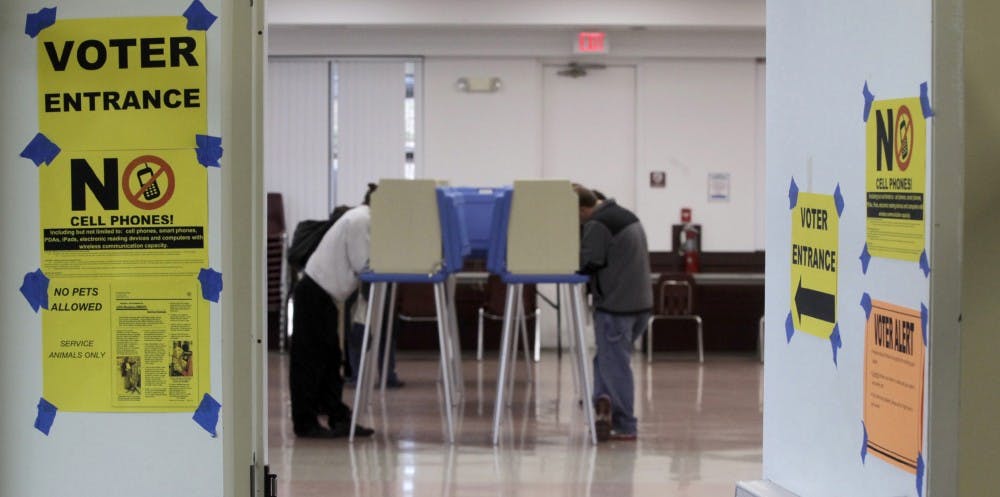In nine of the past ten presidential elections, the Republican party candidate has won the state of North Carolina. President Barack Obama was the lone Democrat to take the state when he won it by 0.32% in 2008.
Obama’s victory was when Michael Bitzer, who runs the political blog Old North State Politics and is a professor of politics and history at Catawba University, saw a shift in the state.
“Basically, North Carolina voters [after 2008] went into their respective political corners and are intensely partisan. The nation as a whole has become deeply divided, and I think that that is playing out here in North Carolina,” Bitzer said. “There are so few persuadable independent people in the middle that I think we are really exemplary of national dynamics.”
Bitzer said North Carolina is a swing state because it is mirroring national trends. According to Bitzer, the urban-rural divide is making the state more competitive.
“The regional aspect of the state kind of mirrors national dynamics, and more and more people are moving to urban and suburban areas. Rural communities and counties are losing population; that’s true across the country,” Bitzer said.
Bitzer also said the growing youth electorate is also contributing to competitive races in the state.
“North Carolina is looking at a dynamic that is also happening nationally, and that is generational replacement,” he said. “Anybody under the age of 40, so millennials and now Gen Zers — basically anybody under the age of 23 — they are coming into the political environment with a very different perspective than what Gen Xers or even baby boomers have.”
North Carolina is a swing state in this year’s election and according to Bitzer, the state will be decided in the suburbs.
Bitzer classifies all suburban counties in one of two classifications. The first is “urban suburban” counties — which defines on his blog as “those outside the central city’s limits but within the same county” — and surrounding suburban counties — which are defined as “the surrounding suburban counties to the urban counties.”
In the 2016 presidential election, the urban suburban counties essentially tied, according to Bitzer, while Trump won the surrounding suburban counties.
“Within the urban suburbs, it went 49-48 Clinton over Trump, — so basically dead even. In the surrounding suburban counties, it was a two-to-one advantage for Trump,” Bitzer said.
Alamance County is considered urban according to the Office of Management and Budget classification. The county has voted Republican for the past five presidential elections. Bitzer said Alamance County “doesn’t fit into the traditional notion of urban counties.”
According to Bitzer in 2016, all North Carolina urban counties combined gave Trump approximately 40% of the vote, but in Alamance County, he got 55% of the vote.
It was the fifth-most Republican urban county in that state.
In the 2020 election, winning North Carolina is more important to the Trump campaign than it is to the Biden campaign, according to Bitzer. Trump needs North Carolina to win what he calls the “solid south.”
“[The Republican] electoral base is very much rooted in the southern states of the United States. If you know, a couple of states get cracked or peeled off by Democrats — Florida, Virginia, North Carolina — that makes it extremely difficult for Republicans to get to 270 electoral votes,” Bitzer said. “So at the presidential level, Donald Trump needs North Carolina in his wind column just to stay viable.”
North Carolina has also seen a large increase in voters requesting absentee ballots due to the COVID-19 pandemic. According to the North Carolina State Board of Election, they have seen close to half a million absentee ballots casted as of Oct. 13. Over 8,000 of those ballots were from Alamance county.
Over 20 days out from the election North Carolina has passed over a million total requests for absentee ballots this year — in 2016 a little over 231,000 total absentee ballots were requested.
Democrats have cast most of the ballots that have already been sent in this year, which is a departure from previous years according to Bitzer.
“So this is a real flip in terms of how the parties are responding. And that also fits into a lot of polling that we know about,” Bitzer said. “Democrats express an interest in voting by mail because they’re concerned about public health issues. Republicans, on the other hand, say, ‘if I can go to Walmart, I’m going to stand in line to vote.’ So, you know, there’s kind of a partisan divide over this issue of voting and the issue of COVID.”
The biggest thing Bitzer said he has learned from the polls this year is to not try and predict anything.
“I think 2020 is such an oddity when it comes to election years, with COVID [and] with the Supreme court seat vacancy that’s being fought over. It’s just ‘expect the unexpected’, because it’s 2020,” Bitzer said.


